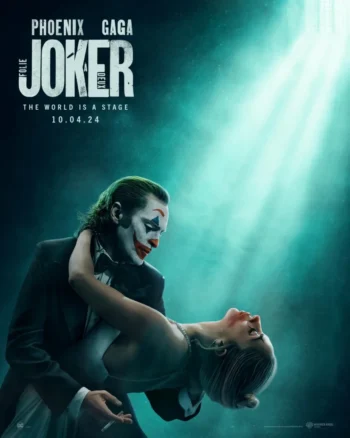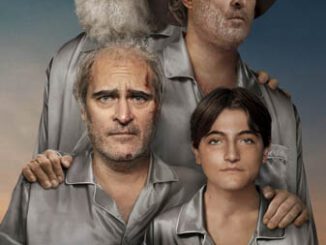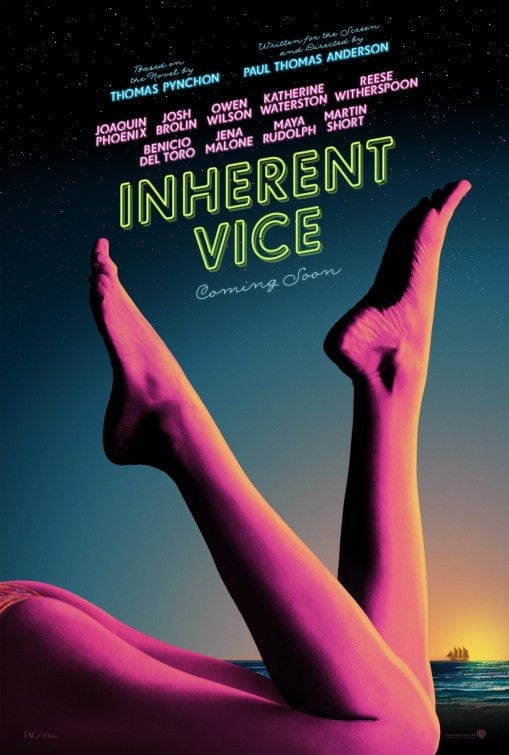Joker: Folie à Deux (2024)
Directed by: Todd Phillips
Written by: Scott Silver, Todd Phillips
Starring: Joaquin Phoenix, Lady Gaga

Joker: Folie à Deux
Directed by Todd Phillips
Roll up, roll up – it’s the trial of the century. After donning the colourful clown garb and killing a popular TV host, among others, Arthur Fleck (Phoenix) is finally due in court. Skeletal, fugue from his medication and unable to do as much as a knock-knock gag, he’s a far cry from the ringleader we saw whip up a riot in the 2019 hit as well as the charming animated opener. His lawyer, Maryanne, thinks he can avoid the death penalty if he’s willing to admit the Joker persona was a temporary break from reality. After all, as the first film established, the modern world, which abandons most of us and treats us like trash, is enough to break anyone. However, he gets his spring back when he meets Lee Quinzel, aka Harley Quinn (Gaga), a superfan who says she saw a made-for-TV movie they made about him like 100 times – apparently it’s ‘really good.’ She soon becomes the love of his life giving him, among other things, companionship, purpose, and, most importantly, the gift of song.
Yes you’ve probably heard Folie à Deux is a musical. Indeed, Phoenix and Gaga work their way through the great American songbook, picking out moderately familiar tracks such as Get Happy, When You’re Smiling and If My Friends Could See Me Now. Pheonix is not a natural singer (to be fair, nor is Fleck – even in his own head) and the presentation is less showy and cathartic than the similarly themed Chicago was decades ago. Still, some are performed with panache and flair, particularly an arresting performance of The Joker (not the Steve Miller Band song) and a decent duet of the Bee Gees’ To Love Somebody. Conceptually, they’re also a novel way of getting into Arthur’s head, making his glitzy fantasy a welcome escape from the drab sadness of the prison. They also represent the few times we actually see Fleck being Mr Jay before the third act. Yet for the most part, the singsongs are poorly integrated into the story, grinding an already slow movie to a halt before snapping back to the tedium.
Readers may remember Todd Philips saying it wasn’t really a musical since the characters were not literally bursting into tune (an alarming distinction for a man directing a musical to make). This means that, with one notable exception towards the start, they do almost nothing to advance the story. Moreover, going entirely with existing songs also means that, like in other jukeboxes, they’re not tailored to the parts and tend to be used in almost comically literal ways. As such, aside from getting in the way of the plot, they also tell us little about Arthur and Lee that we could not already work out. Which brings us to Folie à Deux’s main problem: its vacuous characterisation and reduction of its lead into a emblem of… Nothing much.
Fans of the first Joker probably won’t like what’s essentially a two-hour deconstruction of the meaning many of them projected onto the titular baddy. Like the caped crusader, who shared his traumatic childhood, he’s become a symbol rather than a man. Only because the last did such a superficial job of exploring what he symbolises, this one reverses by revelling in the disappointment of those intent on seeing him as more than he really was. It’s almost Philllip’s way of telling the small amount of viewers who thought he was a righteous antihero that ‘you get what you fucking deserve.’ If Joker was a Rorschach test then this is the creator telling everyone after it was just ink spilled on a page.
And I don’t mean this in an incel/QAnon “they want to punish people for challenging authority” way. That’d be rewriting history since the first was a mainstream success, celebrated by critics and award shows alike. Rather I think it’s navel-gazing writers reflecting and responding to how they unintentionally launched a thousand shitposts with a piece that was more concerned with social services and group hysteria than reclaiming masculinity or some other bullshit (an interpretation that seems farcical considering how much of a “cuck” Fleck was). I’ve rarely seen a movie that seems so embarrassed by aspects its own source material. And I’ve never seen any others where said source material shared a writer, director and leading man. Those (like myself) who thought the previous outing was an empty, derivative husk dressed in state of nation clothing may feel vindicated by some of the commentary. Yet they’ll hardly going to be won over by a film with little more to say than ‘boy, you were right – the first one was shallow huh? Let’s talk about that.’ It’s a self-indulgent work that conflates lengthy thematic conversations with complexity, for which the world is no bigger than its own meta-discourse.
The cast does their best with the second-rate material. Pheonix is typically watchable, and I don’t doubt his commitment to the project. But once again, the directionless writing means Fleck’s journey feels less like a concrete character arc than a series of bits. Gaga is enjoyable in the role of Lee, and the film picks up in the few scenes they actually spend together, though it’s hard to feel invested in a romance that mostly consists of vibes. Yes, she does the musical sequences well – and there are nice moments where her crazy matches his crazy. However, she’s not afforded a lot of psychological depth or motivation beyond loving him for vague reasons, so it’s hard to invest in a relationship undermined by the film’s very premise. The decision to keep them apart for most of its running time is a further misstep in a movie full of them – I’d much rather spend time with them than witness another lengthy court scene. There’s just so little forward momentum or tension to Folie à Deux. The central conflict of whether Joker is another entity from Arthur carries no weight since even he spends most of the film undermining his own defence by denying it.
On that, Fleck makes a circus of the justice system by representing himself, with full makeup and mock Southern drawl, puncturing the groundedness Philips otherwise relies on to prevent the audience from enjoying themselves. Ledger’s incarnation would ask why so serious? No, this would never lead to the clown prince of crime holding the city to ransom – as Phillips frequently reminds us, it’s not that sort of story. But still, it’s so devoid of joy, drama or pacing that it’s hard not to see it as a 200-million-dollar exercise in trolling. Like Love and Thunder, it’s good to see an auteur working in the studio system, though it’s also arguably an advert for why producer notes may not always be a bad thing.
Looking back, it’s hard to believe the original was Oscar-nominated four years ago – perhaps unfairly, its memory has been absorbed into the broader comic book boom and already seems dated. This sequel is presumably the final bow we’ll get from Pheonix’s Joker (the less said about the ending, the better). Still, it’s hard not to admire Todd Philip’s audacity – he got given the big bucks and, unlike the second and third Hangovers, he didn’t just redo the first – even if a lot of the film is literally retelling bits of it. I also always appreciate when big names take a risk and, to be fair, this is one. And while I can’t see it encouraging people to write him blank cheques again, that he got to make such an oddball blockbuster on his own terms means that even if it makes no money he’ll have had the last laugh.







Be the first to comment